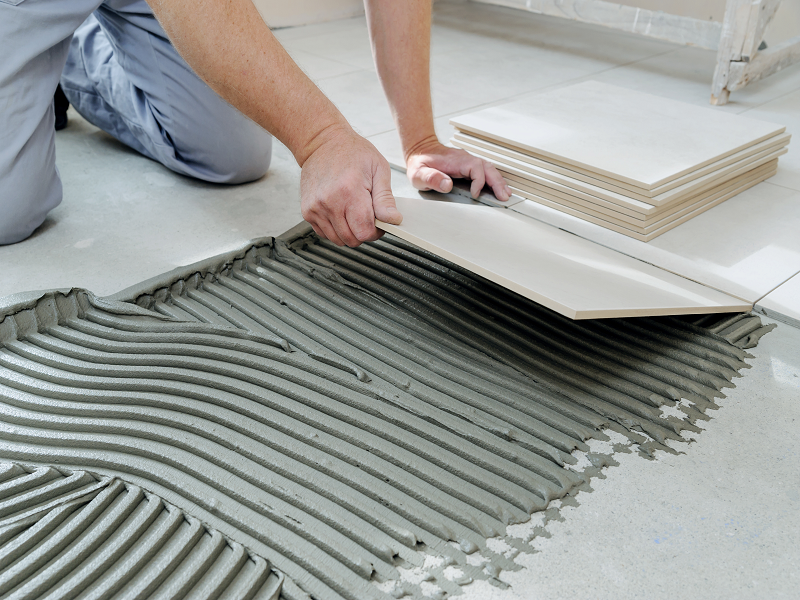Tiling is the process of laying tiles—similar-shaped slabs—on roofs, walls, or other surfaces such as countertops. Tiles dramatically change a space, improving its aesthetic appeal and adding a new element to it.
The History of Tiles
Around 3300 BC, ancient structures such as Babylon produced bright blue, high-sheen tiles that were colored with a cobalt glaze. These tiles were used to create stunning décor within the ancient structures. Similar tiles were created by the ancient Egyptians around the same time frame to line their embroidered tombs and spiritual temples, like the well-known pyramids.
The first tiles were used in Northern Europe during the Middle Ages. Mosaic floors made of lead-glazed tiles were laid in the abbey churches of Fountains, Byland, and Rievaulx in North Yorkshire during the thirteenth century. Tiles are now used much more frequently in homes, particularly in the kitchen and bathroom.
Different Types Of Tiles
Ceramic Tile – is made in a kiln from sand, natural products, and red or white clay. Ceramic tile is an excellent choice for bathrooms, kitchens, entryways, laundry rooms, and mudrooms due to its durability and resistance to stains, odors, and bacteria.
Porcelain tile – like ceramic tile, is made of clay and natural materials and then fired in a kiln. Porcelain, on the other hand, is much stronger, harder, and less porous than ordinary ceramic tiles because it is made with finer clay particles and fired at a higher temperature in the kiln. Porcelain tile is long-lasting, scratch-resistant, and stain-resistant.
Glass tiles – are made of thin shards of glass with a transparent glaze fired onto the back of the tile and are available in a variety of colors. It’s also a more delicate tile option that may chip or scratch over time. Glass, on the other hand, is completely resistant to moisture due to its nonporous structure.
Cement tiles – are made by pouring natural colors into a design mold, filling it with cement, and compressing it with hydraulic pressure. Cement tiles are porous and come in a wide range of shapes, patterns, and designs. Because of its durability, this material is ideal for bathrooms, laundry rooms, and mudrooms.
Marble Tile – Marble is a natural stone that is mined in hilly regions around the world and cut into slabs and tiles. Marble tile can be used in almost every room. But it is especially effective in foyers, hallways, kitchens, bathrooms, and living rooms because it adds design versatility as well as a smooth, high-end aesthetic appeal.
Mosaic tile – is made up of a variety of materials such as ceramic, glass, stone, or porcelain. This material works well both inside and outside, especially in the kitchen, living room, bathroom, hallway, laundry room, and outdoor patio. The material is nonporous, which means it is less prone to mold and mildew, but it is somewhat delicate due to its smaller size.
Granite Tile – Granite is an igneous rock, which means it was formed by lava or magma. Because it is composed of quartz and feldspar, it naturally has a shiny and somewhat glittery appearance, but matte alternatives are also available. Granite is ideal for use in kitchens, living rooms, bathrooms, hallways, and other high-traffic areas of the home because it is long-lasting and resistant to wear.
Different Benefits Of Tiles
Aside from aesthetics, tiles have several other advantages that make them a popular building material:
- Efficient and environmentally: Tile raw materials, such as porcelain, ceramic, and natural stones, are ecologically friendly, making tiles a highly green option.
- Durability: When properly installed, tiles can last a lifetime. They do not need to be replaced as frequently as other surface coverings such as carpets, laminates, and vinyl flooring.
- Contribute to Healthy and Low Indoor Pollution: Using tile in your flooring or wall products lower your risk of VOC (Volatile Organic Compounds) exposure. Tiles are baked at extreme temps in kilns. As a result, they have low levels of VOCs, making them a safer and healthier option.
- Hypoallergenic: Tiles are hypoallergenic because they are resistant to allergy-causing mould, dust mites, bacteria, and germs. This makes them an excellent choice if the occupants have allergies.
Installing tiles can be a time-consuming and difficult process, which is why it is necessary to partner with a professional. The Itile NT team in Darwin offers one of the best and most expert tiling services you will ever see.
We have already been serving Darwin, Palmerston, and Humpty Doo for over 20 years and have extensive tiling and waterproofing experience. Itile NT is a licensed tiler and wall and floor waterproofer. You can trust that our years of experience will meet all of your tiling requirements. Please contact us right away and let us know how we can assist you.

